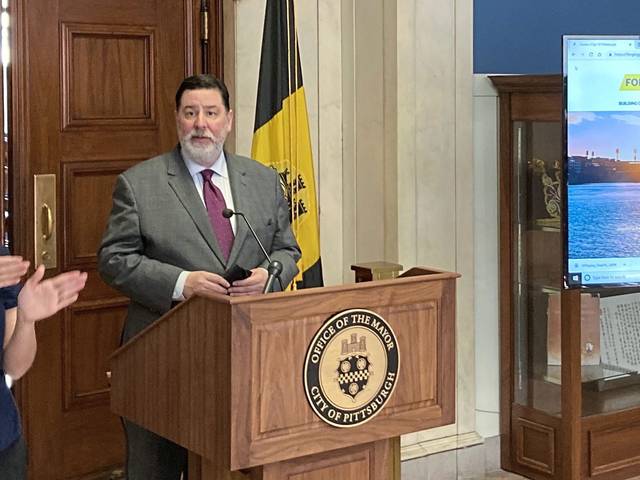Changes in the way the Pittsburgh police department responds to protests in the city appear to be working, Mayor Bill Peduto said Tuesday.
“I think that we have been able to scale back our response from one that was more about domination to one that looks to deescalate,” Peduto said.
The mayor’s assessment differs from how protesters view things, however.
“Nothing has really changed,” said Dena Stanley of the LGBTQ group TransYOUniting.
Stanley has been a regular at many of the protests that have taken place in the region.
It was the first time Peduto has talked about the issue since Aug. 21, when he announced a shakeup within the police department that was made to prevent Black Lives Matter protests from escalating into clashes between police and the protesters.
Peduto halted the practice of initially sending the police Special Response Teams to protests. The city is now using the department’s Civil Affairs and Community Engagement units in an attempt to avoid escalation.
The change has put Civil Affairs Unit members in between protesters and the police, Stanley said.
“But they have no real power,” Stanley said.
The mayor said he’s open to making more changes and called the new response to protests “a temporary assignment.”
“We’re monitoring this situation by situation,” Peduto said.
A sit-in on Saturday in Squirrel Hill was peaceful because tensions on both sides have subsided, Peduto said.
Pittsburgh isn’t alone in dealing with regular protests, and the city has largely been spared the large-scale violence seen in places like Portland, Ore., and Kenosha, Wis.
Leaders of cities across the country participate in group calls, including one on Tuesday afternoon, to engage in what Peduto called “group therapy.”
Leaders are working to find a way to communicate with protesters that although they have a constitutional right to protest, they need to do so with the “parameters of the law.”
“Sometimes our methods are more important than our message,” Peduto said. “We ask everybody to take a breath.”
Responding to the protests isn’t an issue defined by partisan politics, Peduto said.
“What’s missing in this entire issue is the void on a national level that could actually lower and be able to take down and deescalate the amount of conflict and chaos. Instead, what we’ve been seeing is gasoline thrown on the fire,” Peduto said.
The mayor’s comments came at the end of a news conference about a new city land-use plan. They were made about an hour after Pittsburgh Councilman Ricky Burgess called addressing systemic racism “the issue of our time.”
“We have to call it out. It has to be an ongoing conversation,” Burgess said. “We’re going to have to have uncomfortable conversations … to move our city forward. It’s going to be hard.”
Council President Theresa Kail-Smith said she wants council to work with residents “to come together to a middle ground.”
“I want us to have these conversations,” she said.
Protesters want to be a part of the conversation, Stanley said.
But TransYOUniting and the Pittsburgh LGBTQ Coalition emailed officials, including the mayor’s office and police leaders, and have yet to receive a response. “No one has gotten back to us,” Stanley said. “We want to have a sit-down.”








